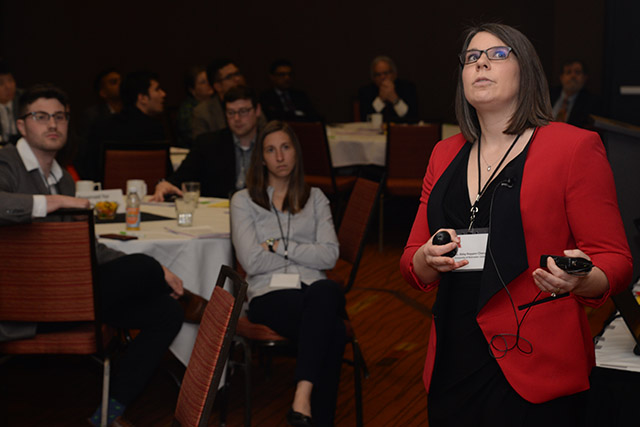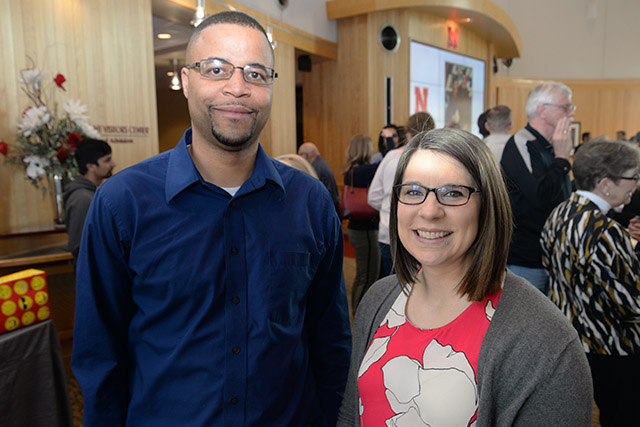Nappier Cherup Presents at Mittelstaedt Symposium
Abby Nappier Cherup’s vision to design and conduct marketing research with real implications for bringing inclusivity to the marketplace drove her to find a Ph.D. program that would allow her to flourish and create change in public policy. Although Nebraska did not initially appear on her radar when considering programs, things began to change when she talked with Dr. Robert Harrison, ’09, associate professor of marketing at Western Michigan University.
“Rob was a Ph.D. graduate of the Nebraska program who was working with me on my master’s thesis,” Nappier Cherup said. “We were talking about schools and he said, ‘What do you think about Nebraska?’ I told him, ‘I’ve never thought about Nebraska.’”
Harrison pointed to Nebraska when guiding Nappier Cherup because he knew the quality of mentoring Ph.D. students receive. He talked about what set Nebraska apart for him.
“I started talking about the ‘Nebraska way,’” Harrison said. “Nebraska tries to develop students into someone they want to work with. That’s the way a good doctoral program should work. So when I gave Abby advice, I told her Nebraska is the place she should go. We started preparing her for the journey and decided to take her master’s thesis and improve it to a level of a publishable manuscript.”
Working with Harrison led to Nappier Cherup presenting at an American Academy of Advertising (AAA) conference. In attendance was Dr. Les Carlson, professor and Nathan J. Gold Distinguished Professorship from Nebraska Business.
“He’s a fellow at the AAA, so he’s kind of a big deal. When Les walks in the room everybody notices. I didn’t know at the time but he came to my presentation and thought I would be a good fit here,” she said.
 Nappier Cherup presented her research at the Mittlestaedt Symposium to faculty and students from throughout the country.
Nappier Cherup presented her research at the Mittlestaedt Symposium to faculty and students from throughout the country.
After making a few Nebraska connections and applying to the program, Nappier Cherup’s GMAT score did not quite reach where it needed to be. Finding out Carlson wanted her in the program helped inspire her to work diligently on raising her test score while simultaneously working full-time. She knew Nebraska had the support to let her accomplish the research she wanted to tackle.
“I observe and interview people from a stigmatized group of consumers. I’m looking at people who identify as bisexual or bi-plus, because they’re part of the LGBT community but they often face discrimination in that community, as well as in mainstream society. This was a topic I’d been interested in for a long time,” she said.
Meeting with marketing faculty, she felt welcomed and encouraged to follow her interests. After qualifying for the program she moved to Lincoln to begin her next chapter.
“I talked about my interests in my interview because not a lot of programs will let you study the topics I wanted to pursue. I thought, if they’re okay with it this might be a good place for me, and Les has always been supportive.”
One of Nappier Cherup’s qualities that caught Carlson’s eye was her focus on policy issues. Taking the research and applying it directly to the public interest fit what Carlson always tried to do himself.
“I like to see marketing as more than selling things, but also having public policy implications,” said Carlson. “Abby has those same interests and brought that perspective into my Marketing Public Policy Ph.D. seminar. She’s assumed a leadership role among Ph.D. students by putting issues she works on in a broader perspective of the public policy arena.”
At the 2019 Mittelstaedt Doctoral Symposium, facilitated by the Department of Marketing which welcomed Ph.D. students and faculty from more than 25 schools across the U.S. and Canada, Carlson and his colleagues selected Nappier Cherup to kickoff the symposium. He saw her research presentation as a blueprint for other students to follow.
 Dr. Robert Harrison (left) helped guide Nappier Cherup on her master's thesis which led to connections at Nebraska.
Dr. Robert Harrison (left) helped guide Nappier Cherup on her master's thesis which led to connections at Nebraska.
“We knew she’d be an excellent representative of what we’re trying to foster at the symposium. Abby’s further along than other presenters, so we wanted to show not only what’s going on at Nebraska in research, but also demonstrate how you can progress through a program and deliver a final presentation someone else in the audience might develop toward.”
Nappier Cherup received positive feedback on her research from both students and faculty at the symposium. Attendees pointed out the ability to grow her research in a variety of directions.
“The Mittelstaedt Symposium is an awesome thing we do,” said Nappier Cherup, who intends to graduate from the program in May 2020. “I’ve been to other conferences and symposia, and there’s a feeling of warmth here you don’t get a lot of places. It’s a way for students to come together, share research and get feedback from peers who will eventually become your peer faculty. Nebraska, in particular has a way of producing people who are very active in research and the symposium gives me a chance to meet them again when they come back to Lincoln.”
Nappier Cherup wants to continue setting high standards in her research in order to influence public policy. Her belief is that Nebraska provided a solid foundation to jumpstart her professorial career and in turn make the world a more inclusive place.
“My background is in the nonprofit sector, and I feel very committed to social justice and serving my community to make lasting change. My hope is by studying this specific group of bisexual consumers it gives examples of what this discrimination looks like, and can help develop implications of what marketers can do to be more inclusive, raise awareness and better serve consumers,” she said.
Published: April 2, 2019